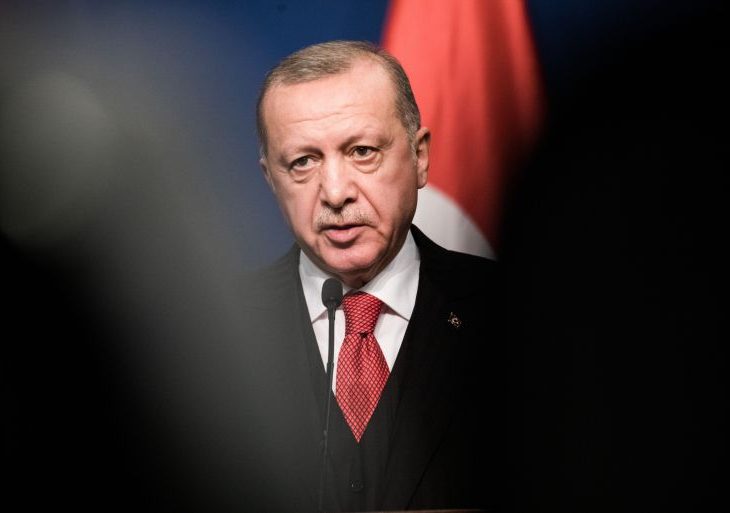Western banks pull out of Turkey financing, UAE jumps into the void
 arap-zengin
arap-zengin
United Arab Emirates-based banks are increasing loans to their Turkish counterparts, filling a gap left by Western lenders that have retreated amid concerns over the country’s increasingly restrictive regulatory environment under President Recep Tayyip Erdogan, reported Bloomberg.
Turkey’s CDS premiums far above of peer EMS, and massive financial repression measures crimping bank profitability and risk-taking capacity may have also contributed to reluctance by Western banks to finance the country.
Two of the Gulf state’s biggest lenders, Abu Dhabi Commercial Bank PJSC and Emirates NBD PJSC, arranged 61% of all syndicated loans, which involve multiple lenders and one borrower, to Turkish banks in the first half of the year, compared with about 15% during the same period a year earlier, according to data compiled by Bloomberg.
By comparison, the likes of ING Groep BV, Deutsche Bank AG, Citigroup Inc., and Standard Chartered Plc — which have lent to Turkish banks every year since 2021 — arranged 18% of loans, down from 33% a year ago.
Many international banks turned increasingly cautious on Turkey in the run-up to crucial elections in May that saw Erdogan reelected for another five-year term. Although the president is now setting the stage for a change in economic course, he has long championed an unorthodox economic policy based on ultra-low interest rates, which has come at a high cost in the form of depleted foreign-currency reserves, an inflationary spike, and an exodus of foreign capital.
“Western lenders are wary about Turkey’s risk although there is no Turkish loan repayment problem,” said Batuhan Ozsahin, chief strategist at Istanbul-based brokerage Ata Invest. Gulf countries “are ready to take more Turkey risks and so we see them more in lending to Turkish syndicated borrowings.” On the other hand, numerous Turkish economists warned the government that short of a course change in economic policy, Turkey may be swept into default within a year.
The UAE’s appetite for Turkish loans is also politically significant. Gulf countries have been improving ties with the country after a decade of frosty relations that rippled across the Middle East. This has led to a series of trade deals, currency swap agreements and investment in the country, including Emirates NBD’s acquisition of Denizbank AS in 2019.
Turkey signed a $4.9 billion currency swap agreement with the UAE last year to prop up its depleted foreign reserves. In 2021, Qatar extended a swap agreement of as much as $15 billion between the two countries that was originally signed in 2018.
Turkish assets on sale to Arab investors?
Some experts claim, Erdogan’s new economic orientation is to tactically embrace tight money and fiscal policy under the guidance of Mehmet Simsek and new Central Bank governor Gaye Erkan while biding his time for financing from Gulf countries to mature. Erdogan is claimed to have ambitious plans to sell flagship Turkish assets like Turkish Airlines and the two telecoms giants Turkcell and Telekom to Arab investors. Also rumored that the loss-making Istanbul Airport, could witness change of owners to generate hard currency for the ahs-poor Central Bank.
Economic Reforms
Turkish banks “may have preferred GCC banking leads in recent syndications due to heightened trade and banking relations with those banks,“ said Pinar Uguroglu Delice, a banking analyst and head of equity research at BNP Paribas’ Turkey unit TEB Yatirim.
Despite the increased interest from UAE lenders, foreign borrowing by Turkish banks is at an all-time low due to higher borrowing costs and weaker domestic demand for hard currencies. The amount of syndicated loans arranged this year dropped 55% to $2.9 billion from $6.4 billion a year earlier, according to the data.
With Erdogan indicating that he will give his new economic team more leeway in altering policy, which could open the way for a shift from years of unconventional measures, foreign investors may be drawn back into the country.
“Expected new economic reforms may change this trend, with the next round of syndications in the third and fourth quarters serving as a litmus test for foreign investors’ perception of risk in Turkey,” said Tomasz Noetzel, a senior emerging-market bank analyst at Bloomberg Intelligence.
In contrast, Turkish analyst believe the new economy tam must deliver concrete results on new economic policies in terms of currency stability and current account deficit sustainability to attract new bank loans.
Follow our English language YouTube videos @ REAL TURKEY: https://www.youtube.com/channel/UCKpFJB4GFiNkhmpVZQ_d9Rg
And content at Twitter: @AtillaEng
Facebook: Real Turkey Channel: https://www.facebook.com/realturkeychannel/





